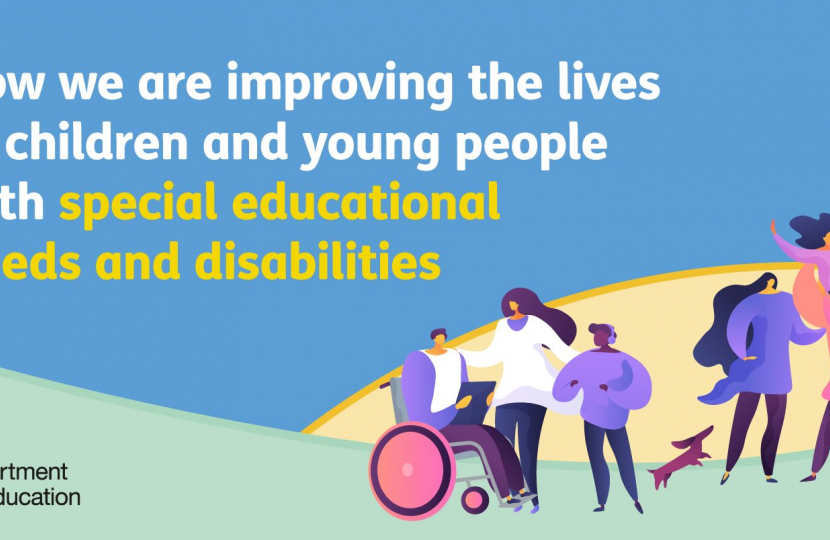Better support for children and young people with special educational needs and disabilities (SEND) is at the heart of a new national plan to level up opportunities, with a key focus on ending the postcode lottery that leaves too many with worse outcomes than their peers.
The government has published a new SEND and alternative provision green paper, setting out its vision for a single, national SEND and alternative provision (AP) system that will introduce new standards in the quality of support given to children across education, health and care.
The ambitious green paper is the result of the SEND Review, commissioned to improve an inconsistent, process-heavy and increasingly adversarial system that too often leaves parents facing difficulties and delays accessing the right support for their child.
The plans to reform the system will be open for a 13-week public consultation, giving families frustrated by the existing, complicated and bureaucratic system of support the opportunity to shape how a new system will work in the future - and give them confidence that their local school will meet their children’s needs so they can achieve their full potential.
Detailed proposals in the SEND and alternative provision green paper include:
- Setting new national standards across education, health and care to build on the foundations created through the Children and Families Act 2014, for a higher performing SEND system;
- A simplified Education, Health and Care Plan (EHCP) through digitising plans to make them more flexible, reducing bureaucracy and supporting parents to make informed choices via a list of appropriate placements tailored to their child’s needs, meaning less time spent researching the right school;
- A new legal requirement for councils to introduce ‘local inclusion plans’that bring together early years, schools and post-16 education with health and care services, giving system partners more certainty on who is responsible and when;
- Improving oversight and transparency through the publication of new ‘local inclusion dashboards’ to make roles and responsibilities of all partners within the system clearer for parents and young people, helping to drive better outcomes;
- A new national framework for councils for banding and tariffs of High Needs, to match the national standards and offer clarity on the level of support expected, and put the system on a financially sustainable footing in the future;
- Changing the culture and practice in mainstream education to be more inclusive and better at identifying and supporting needs, including through earlier intervention and improved targeted support;
- Improving workforce training through the introduction of a new SENCo NPQ for school SENCos and increasing the number of staff with an accredited level 3 qualification in early years settings; and
- A reformed and integrated role for alternative provision (AP), with a new delivery model in every local area focused on early intervention. AP will form an integral part of local SEND systems with improvements to settings and more funding stability.
The proposals are backed by new funding to implement them, worth £70 million. This will build on the £9 billion government investment in local authority high needs budgets next year and £2.6 billion for new places for children with SEND over the next three years.
Taken together, this is a significant, transformational investment for children who need the most support, sitting alongside recent increases to the respite and Supported Internship programmes, as part of measures to invest in the SEND system and in helping children achieve.
The proposals, part of a package of education measures being announced this week and following on from the Schools White Paper, outline a vision for a more inclusive, consistent, transparent and accountable SEND system. The emphasis is on providing the right support to children in the right place and at the right time by:
- boosting confidence in the system and raising standards all over the country;
- changing the culture of mainstream education, putting it on a par with specialist settings;
- streamlining the system from the early years to post-16 so that every pupil receives a good foundation in support all the way through their education;
- requiring the different services involved in providing support for children with SEND, from schools and councils to healthcare providers, to work more closely together increasing accountability and scrutiny; and
- ensuring the SEND system is financially sustainable by making sure funding is targeted where it makes the most difference.
-
Capital funding allocations worth £1.4 billion have also been published today for councils to pay for new places and improve existing provision for children and young people with SEND, or those who will benefit from high-quality AP. This funding will help stabilise local systems ahead of any further legislation from the green paper proposals.
The Government will also look to approve up to 40 new special and AP free schools in regions where they are most needed. This is in addition to over 60 special and AP free schools already in the pipeline.
Low-income families with seriously ill or disabled children will be further supported through investment of £27.3 million next year. This funding will help pay for equipment, goods or services - from washing machines and fridges to sensory and educational equipment that they might not otherwise be able to afford.
Over £10 million will also be invested to train over 200 more educational psychologists from September 2023, to give advice and input into EHCP assessments, advise schools on how to support pupils with SEND and offer wider wellbeing support to them, their families and teachers.
The Government will work with Ofsted and the Care Quality Commission to strengthen ability to hold local areas to account against these standards.
Over the course of the Review government has listened to the experiences and insight of hundreds of children and young people, their families, sector organisations, teachers and partners. The Government’s SEND and alternative provision green paper sets out a response to their feedback. The consultation will be open for 13 weeks.
Following a contract award, Premier Advisory Group will provide support throughout the Department’s application and assessment process for new waves of mainstream, special and alternative provision free schools.
Vulnerable children in care or with a social worker will also continue to be supported through continued Virtual School Head (VSH) funding, backed by £16.6 million for the next financial year, to keep championing the needs of looked-after children and support them with their attainment.


